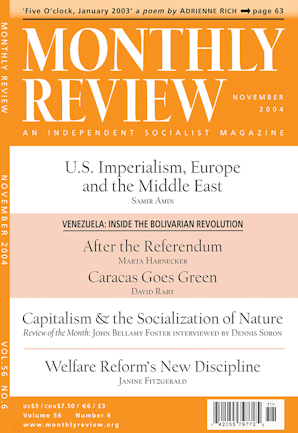Also in this issue
Article by Dennis Soron
- Eco-Marxism and the Reconstruction of Materialist Dialectics
- Western Marxism and the Myth of Capitalism's Adamantine Chains
- Introduction to the Updated Edition of Arghiri Emmanuel's ‘Unequal Exchange’
- Robert W. McChesney (1952–2025): A Personal and Political-Intellectual Memoir
- Eco-Marxism and Prometheus Unbound
- Ecological Marxism in the Anthropocene
- Marx and Communal Society
- ‘Gleichschaltung’ in Nazi Germany
- The Trump Doctrine and the New MAGA Imperialism
- MAGA Ideology and the Trump Regime

